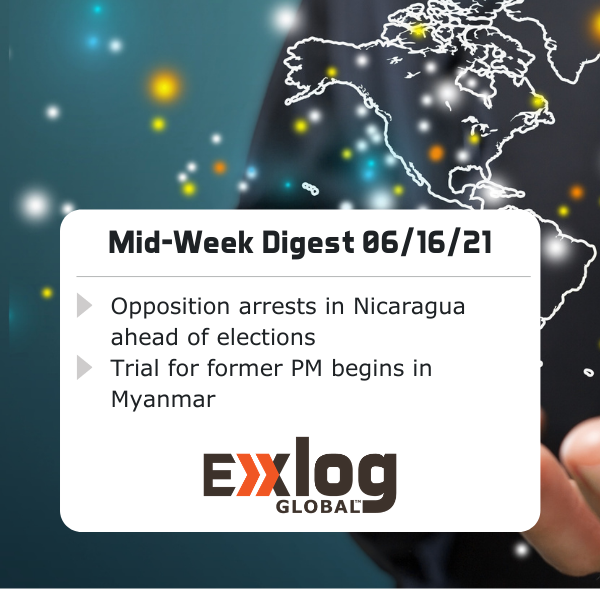Nicaragua: Opposition figures arrested by Ortega government ahead of November elections
President Daniel Ortega’s government has jailed over a dozen political opponents in the past two weeks in what many domestic and international observers believe is an attack on democracy and a move towards dictatorial rule. The arrests began June 2, shortly after Christine Chamorro Barrios—daughter of former president Violeta Barrios—announced her candidacy for president in the upcoming Nov. 7 election. Chamorro Barrios, viewed as a solid contender to oust Ortega, was arrested on money laundering charges for her role in a non-profit, free press advocacy group – she denies all charges. Following her arrest, the Ortega government detained three more declared presidential candidates and five prominent opposition figures on similar charges; the current number of arrests stands at 13.
While Ortega has not yet announced his intention to run for his fourth consecutive term, his government passed legislation in Dec. 2020, allowing it to declare Nicaraguan citizens “terrorists” and subsequently ban them from running for office. This granted Ortega the power to detain and prevent any potential political rivals from challenging him or a chosen successor in the upcoming election. The legislation further bolstered Ortega’s growing iron grip on the country following his consolidation of the government, including the Supreme Court and Electoral Council, and his regime’s criminalization of anti-government protests in 2018. These changes were instituted in the aftermath of the deadly 2018 protests against his social security reforms.
The arrests have brought swift condemnation from international rights organizations and spurred the US to announce sanctions against Ortega’s inner circle; the UN has called for the release of the political leaders. However, it appears that international sanctions will have little effect, increasing the likelihood for potential unrest in the lead up to the election, especially if arrests continue.
Myanmar: Former PM Aung San Suu Kyi’s trial begins as the junta solidifies its hold on the country
An increase in nationwide civil unrest is likely over the next month as Myanmar’s ruling military junta conducts its corruption trial against former Prime Minister Aung San Suu Kyi. Ousted in the Feb. 1 coup, the charges presented during the first hearing on June 14 included corruption, illegally possessing walkie-talkies, and breaking coronavirus protocols – the trial is expected to continue through Jul. 26. Following the initial trial’s conclusion, Suu Kyi will be tried separately for other charges, including her alleged violation of the archaic Official Secrets Act and bribery. Pro-democracy activists and the international community have claimed that the charges are politically motivated and intended to keep Suu Kyi detained, thus ending her political career. During the hearings, pro-democracy activists returned to the streets—especially in Yangon—despite the junta’s violent crackdowns and threats that had contributed to the recent reduction in protest attendance.
Street protests are likely to continue throughout the trial, particularly on Mondays and Tuesdays – to coincide with the hearing times. In addition to the court hearings, the military junta has taken further steps to erase Suu Kyi’s influence on Myanmar’s political arena; they have designated the rival National Unity Government (NUG)— consisting of Suu Kyi supporters—and other opposition groups as terrorist or treasonous organizations to prevent them from disrupting their consolidation of power. Parallel to the civil unrest movement against the junta, there has been an increase in low-level armed insurrections (especially in the eastern Kayah and Kayin States) by both militia groups formed post-coup and existing ethnic militias. The junta has blamed multiple recent bombings and arsons on the armed militia wings of certain ethnic groups; while these allegations remain unconfirmed, they highlight growing tensions over ethnic autonomy rights in the eastern regions. Though some groups—including the NUG’s People’s Defense Forces—have announced temporary ceasefires to protect innocent civilians caught up in the recent violence, further escalation is likely as both political and ethnics militias continue to reject the junta in favor of Suu Kyi’s more democratic system of government.
As the military seeks to further solidify its hold on the country, Myanmar will likely remain in a state of unrest until more democratic solutions are implemented, or a more drastic military crackdown occurs.


